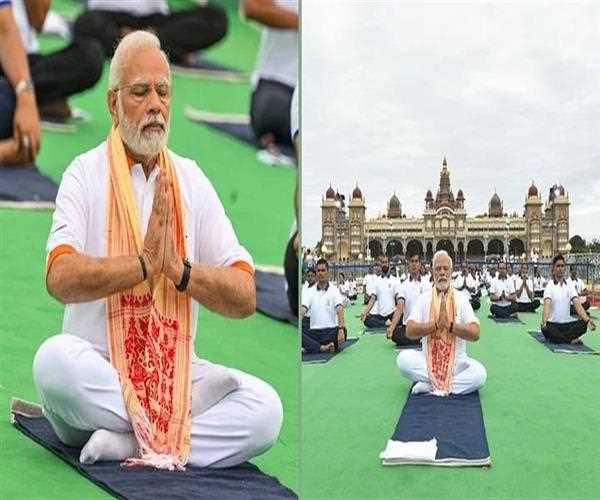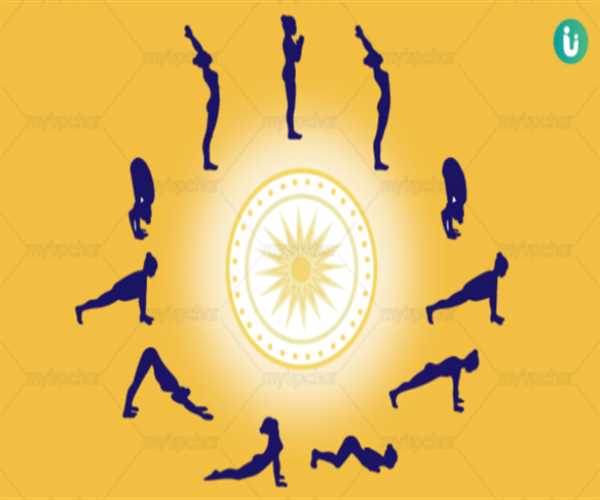
21-Jun-2022 , Updated on 6/22/2022 4:01:25 AM
INDIA CELEBRATES 8th INTERNATIONAL DAY OF YOGA
The COVID-19 outbreak has been a human disaster unlike any other. Beyond its immediate impact on physical health, the COVID-19 pandemic has intensified psychological distress and mental health problems, such as sadness and anxiety, in many nations, since pandemic-related restrictions were implemented in various forms. This has underlined the critical importance of addressing both the physical and mental health components of the epidemic.
During the epidemic, people all over the world turned to yoga to keep fit and revitalised, as well as to combat social isolation and sadness.
Yoga is also helping COVID-19 patients in quarantine and isolation with their psychosocial treatment and rehabilitation. It is very beneficial in calming their concerns and anxiety.
Balance is at the heart of yoga, not simply within the body or between the mind and the body, but also in the human interaction with the world. Mindfulness, moderation, discipline, and perseverance are all virtues emphasised in yoga. Yoga, when applied to communities and cultures, provides a way to long-term sustainability.

Yoga has the potential to be a significant tool in humanity's collective struggle to promote a sustainable lifestyle in harmony with the earth. The theme for this year's Yoga Day events is 'Yoga for Humanity,' in keeping with this attitude.
Yoga is an Indian physical, mental, and spiritual discipline that dates back thousands of years. Yoga is a Sanskrit term that means 'to connect' or 'to merge,' and it represents the integration of body and awareness.
It is now performed in various forms all around the world and is growing in popularity.
The United Nations declared 21 June as the International Day of Yoga on 11 December 2014, recognising its worldwide appeal. Since 2015, the International Day of Yoga has been observed yearly on June 21. Yoga is an ancient Indian physical, mental, and spiritual discipline. In his 2014 UN address, Indian Prime Minister Narendra Modi proposed June 21 as the date since it is the longest day of the year in the Northern Hemisphere and has special significance in many regions of the world. “Yoga is an invaluable gift from our ancient tradition,” he remarked. “Yoga embodies unity of mind and body, thought and action ... a holistic approach [that] is valuable to our health and our well-being. Yoga is not just about exercise; it is a way to discover the sense of oneness with yourself, the world and nature.”
The celebration of the 8th International Yoga Day under the theme 'Yoga for Humanity' could not have come at a more opportune time, according to Abdulla Shahid, President of the United Nations General Assembly's 76th Session, as the COVID-19 pandemic has upended lives and livelihoods, triggering a deluge of anxiety and depression.
The goal of the International Day of Yoga is to increase awareness of the various advantages of yoga across the world.
Yoga has proven effective in maintaining the body and mind in good health since the 5th century in India. Yoga is a comprehensive method that focuses on all of the body's and mind's systems. According to legend, asanas strengthen and stretch the body, improving health while also instilling confidence in the mind. Pranayama is a better and more effective adjunct to asanas for regulating the cleansing of the internal system and organs. These physical techniques produce energy in the body, which is then channelled into meditation or Dhyan for stability, tranquilly, and quiet.

Shiva, according to Hindu mythology, is credited with founding yoga. He is known as the
Adiyogi, or 'first yogi.' The summer solstice is significant in yogic culture since it is considered the beginning of yoga. The 'Saptarishis' introduced yoga to the general public.
The International Day of Yoga is undoubtedly a boon to the popularity of this ancient and beneficial discipline, which benefits millions of people throughout the world. Yoga changes and evolves in response to the sociopolitical and cultural milieu in which it is practised. It has always been and will continue to be a personal and personalised practice, with the practitioner determining the meaning and advantages as she continues along the road.
Yoga should be honoured every day, not only on special occasions. It promotes mental and physical well-being as well as a sense of connection to nature. Additionally, frequent yoga practice makes your body more flexible, and you acquire a strong feeling of self-discipline and self-awareness. In a nutshell, it boosts our mood and increases our mental sharpness. When practised on a regular basis, yoga offers several advantages. It protects our minds and bodies against the majority of illnesses. If everyone is on the same page, life will be happier, calmer, and more meaningful. So, if you want to grow a strong and flexible body, reduce weight, be at peace, have excellent health, and be attractive, you may do so by practising yoga on a regular basis.
We may sharpen our minds and boost our brains by doing yoga. Yoga practice can help you acquire a greater degree of concentration. When done on a daily basis, it also aids in the development of self-discipline and self-awareness.
One feels quite peaceful and disciplined when practising yoga. It is a wonderful experience to join the body and its organs with the soul via meditation. When one learns to meditate, he or she may transcend from corporeal existence and attain a serene state of mind, bringing harmony into one's life. One gains spiritual self-control through learning to regulate one's bodily self, emotions, and wants.

Student
current post-graduate student at christ university and an aspiring content writer with experience in working on online content creation and research..
Join Our Newsletter
Subscribe to our newsletter to receive emails about new views posts, releases and updates.
Copyright 2010 - 2026 MindStick Software Pvt. Ltd. All Rights Reserved Privacy Policy | Terms & Conditions | Cookie Policy